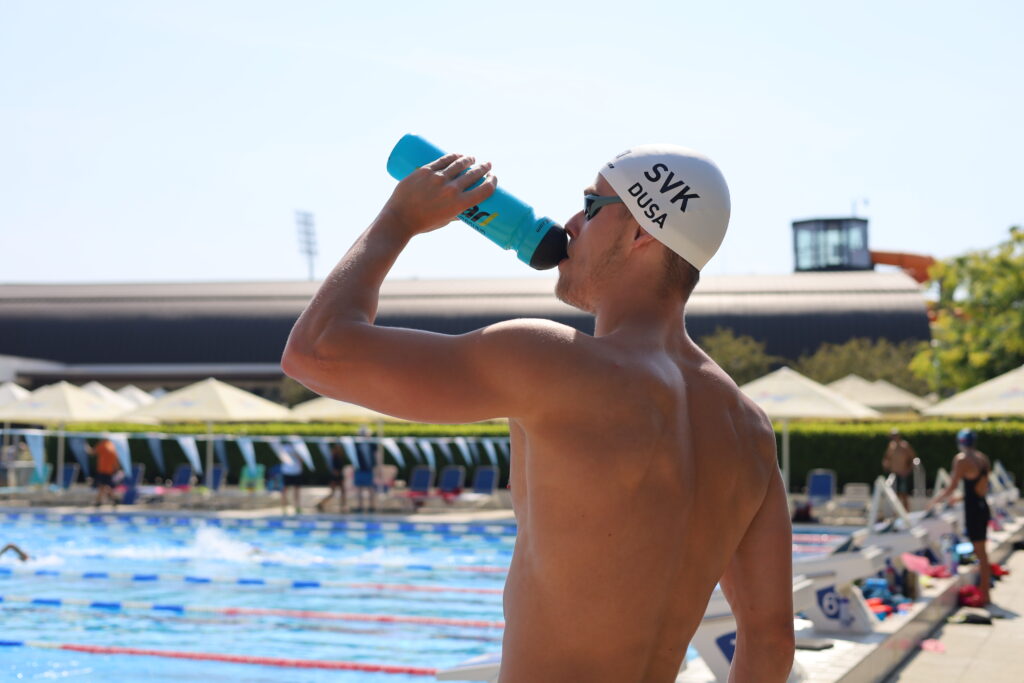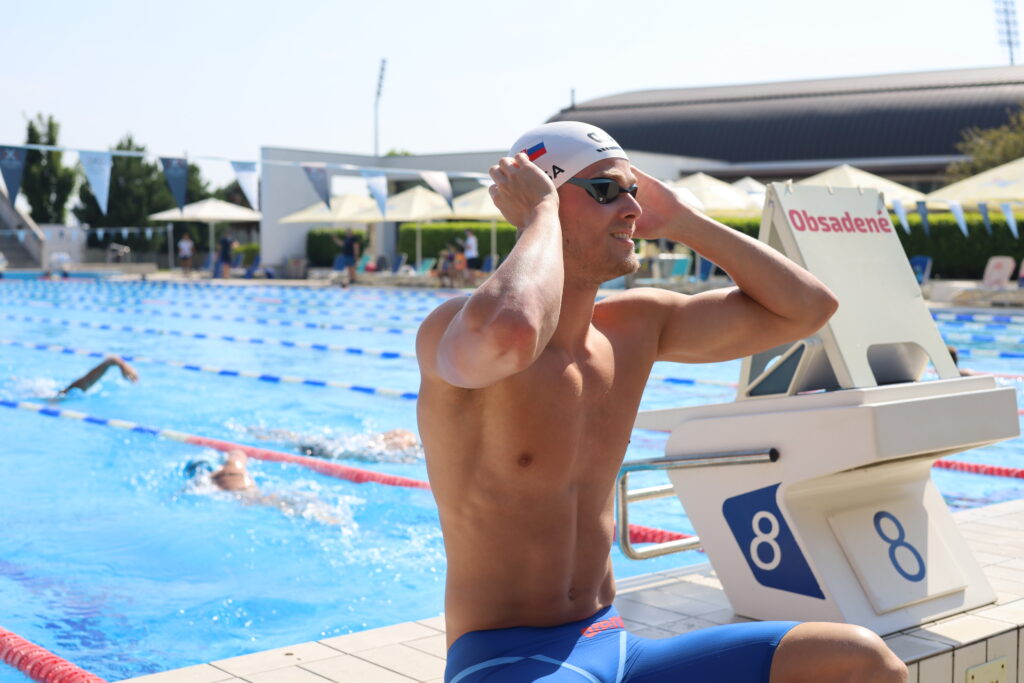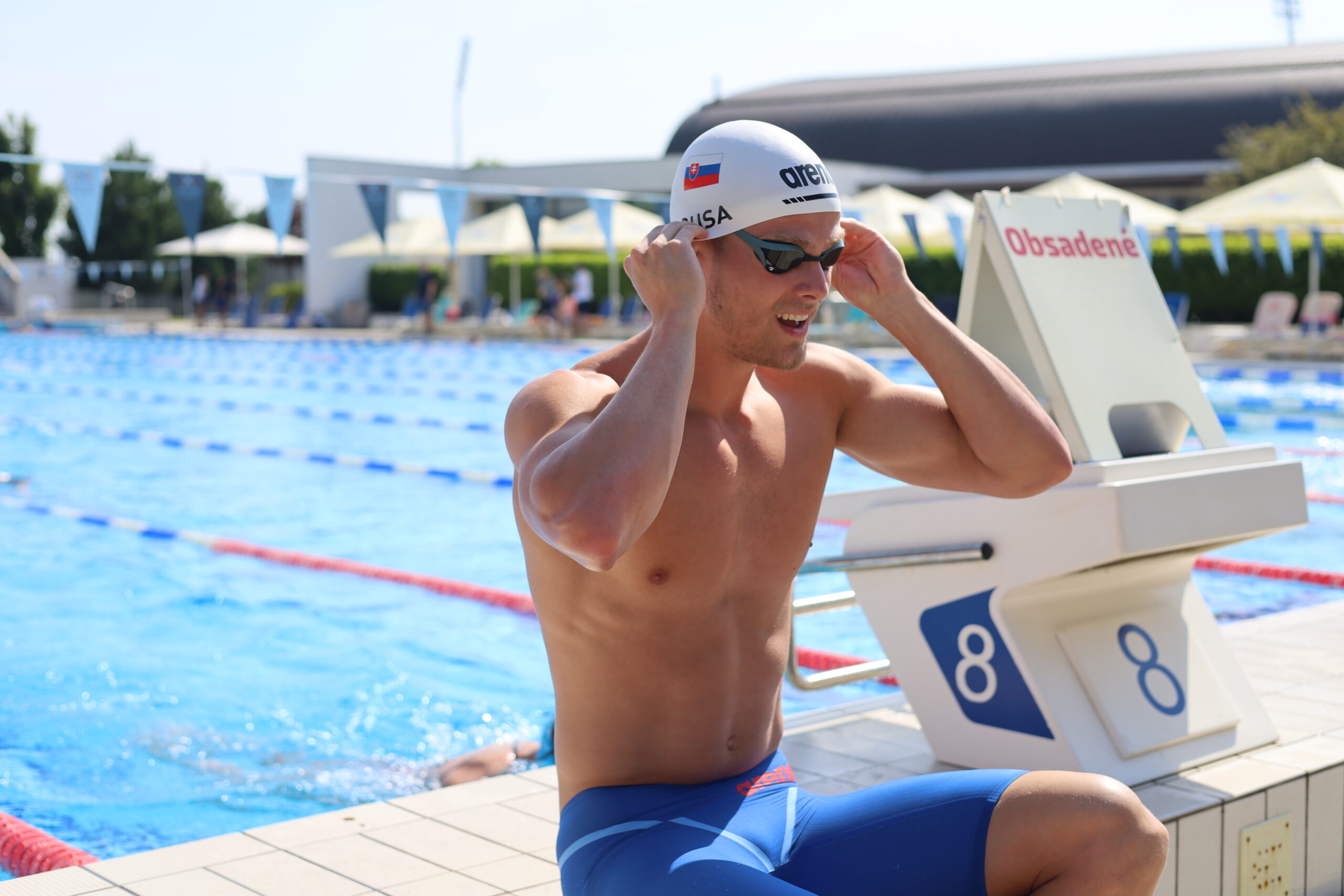“A few weeks before the race I stop taking the stairs and I use my phone minimally,” Matej Duša (24), the Slovak national swimmer, told us at the beginning of July when we talked to him about preparing for his first Olympics. Under the guidance of his American coach and together with Czech swimmer Daniel Gracík, he was finishing his intense two-week preparation for Paris at the x-bionic® sphere.
Let’s jump straight into the water with the first question: why swimming and not any other sport? I was four years old, my brother a year younger, and we were often sick. Because of our weakened immunity, the doctor prescribed swimming to strengthen our sick lungs and our whole body. When we got a little older, my mother liked having two hours twice a week all to herself. And that we would come home tired from our workouts and not feel sick afterwards. So we were kind of forced into it, too. (laughs) In high school, I realized that I was getting better at swimming, and since I’d been doing it since I was four, it would be a shame not to continue.
This year it will be twenty years that it’s kept me going. Which swimming discipline is closest to your heart? I officially made it to the Olympics through the 100m freestyle. It’s also called the royal discipline because practically everyone has trained for it. There’s a lot of competition. I’m good at it, but not as good as I am at the fifty-meter freestyle. The fifty, the shortest possible distance, is also the one I enjoy the most. I’m good at sprints because physiologically I have a lot of fast-twitch muscle fibres and it’s easy to build up strength, which is important in sprinting. And the other thing is that I need the mental boost of going for broke. My brain is not content with me spinning around in a pool and singing to myself. (laughter). The fifty-meter freestyle is a discipline that doesn’t forgive you anything. It starts with the moment you wake up on race day, and from that moment on, everything that happens can make or break the race by the hundredths.
What can “shake” your performance before a race? A lot of things. All the preparation for any race starts long weeks before I stand on the start line. It’s not just about training in the pool or gym, recovery or diet. It’s also about habits, mental setup, working with energy reserves. I don’t spend my energy on anything but what I absolutely need. A few days before the race, when I’m more or less rested, I stop taking the stairs. Where I can, I take the elevator. I walk slowly and don’t take an extra step. I walk up the stairs like an old gentleman from the pool. (laughter). In the weeks leading up to the race, I try to limit my phone use so that I don’t just make dopamine out of thin air, but I have to earn it. Meditation and performance visualization also come into it.
You study and train in the USA. Didn’t you also want to prepare for the Olympics there? In the US, the season ends in March after the US Championships. I return home in May and spend my summers in Slovakia. I live in Bratislava and every day I go to Šamorín for training. This summer, in preparation for the Olympics, I also spent two intense weeks at the resort with my American university coach, Nick, and Czech swimmer Daniel Gracík, who swam the 100-meter butterfly at the Olympics. Since I have coaches in America, it is very difficult for them to train me regularly in Slovakia. I am especially grateful to Martina Moravcova that she managed to organize this before the Olympics and my coach Nick came to Slovakia. The x-bionic® sphere is my home pool, I have exactly the mental well-being I need here.
What did the training in the pool consist of? The weight training, for example, looked like we had a hundred-pound tower attached to our belt, which created resistance, and we pulled it behind us for almost an hour and a half while swimming. Since we had three hours of heavy resistance training in the morning, we then spent the whole afternoon recovering, stretching and doing various compensatory exercises.
And the next day the same thing happened again? No, the next day we had a light programme to let the nervous system rest a bit. Then on the third day we put on our racing swimsuits and did a race simulation. We practiced technique, sprints, timing from the bounce to the first stroke, accurate distances. We did the race simulation twice a week to practice exactly what we were going to do on D-Day.
What do you need to have in order to be able to concentrate fully? For training, I much prefer the resort sports centres, where I wake up and can practically go from the canteen straight to training and I don’t have to do any preparation. During the training camp in Mallorca I had a pool from the accommodation about a kilometer away. It was not far, but even such a “detail” can affect everything – the schedule of the day, concentration, mood, energy level. When I have everything under one roof, I don’t have to think about what I can’t forget to take out of my room in the morning. I can just focus on my performance.
Training facilities, equipment, communication…Which of these is the most important for you? It’s important for me to have training at the times I need. It’s not quite ideal for me to have a free lane available in the pool at say 6am, when a sleepy body is just barely kick-started to perform at its peak. Therefore I appreciate the fact that the x-bionic® sphere has been kind to me and I have been able to train in the pool from 9:00-11:00, which is also the time when the real train in the pool from 9:00-11:00, which is also when the real race was. It’s crucial for an athlete to set up a routine. Another thing is the gym equipment. I don’t do bodybuilding training, but sports, movement, performance training, and I need different equipment for that: belts, kettlebells or weightlifting platforms, which I couldn’t do without. And as part of my recovery, a spa with an ice pool and hot showers suited me just fine. The last icing on the cake was the aforementioned weight tower. I had the same training conditions in the resort as in America.
Is it possible to combine studies with top sport in the USA?
Most people will be surprised that I am doing two undergraduate degrees at the same time. One in mathematics and the other in data science. I can count on one hand the number of swimmers who have graduated with a bachelor’s or master’s degree in the U.S. and competed at a higher level. A swimmer in Slovakia turns eighteen, graduates and thinks he or she will be the first to graduate from college and pursue swimming professionally. Most of the time, he doesn’t make it. The system in Slovakia is not set up that way.
Is it different in America? Sport is not an obstacle to studying here and studying is not an obstacle in sports. On the opposite. In the USA, there is a sports league called the NCAA (National Collegiate Athletic Association), which includes selected colleges and universities and the whole system is set up to ensure that we can be elite sportspeople and still graduate.
How does it work there? I went to America when I was twenty years old, I had just finished my fourth year in high school. My school’s approach was that not only would I get a diploma while I was studying, but they would also put me in the Olympics. And that’s exactly what happened. The coaches are connected to academics, the school hires managers and advisors to students to pursue both their sport and their studies. I swim for the university team, and my practices are set up so that they don’t conflict with my classes. We choose our own schedule, I choose what subjects I want to study in a given semester. Of course, some of them are compulsory, but for example, I’ll take the harder subjects in the autumn semester when I don’t have championships, and I’ll choose the easier subjects for the semester from January to May, because that’s when the university league peaks and the world championships are held. I adjust my schedule so that I don’t burn out and can excel in school and sports.
Does swimming help you to compensate for your busy studies? When I’m in school learning advanced calculus on a complex surface, my brain is so fried that jumping in the pool and working out is actually relaxing for me. (laughs) The way it physically hurts to practice isn’t as bad as it is when I’m thinking for two and a half hours over the formula on the whole board. There’s an advantage to “firing up” mentally and physically afterwards. (laughs)
What do you do in your free time? I play chess. In America there are terribly long study holidays, from the end of April to September. I devote myself to it to keep my brain active. I try not to be on Instagram and social media all day, but also to train my memory, tactics… And then I do normal, everyday things like all young people do. I was expecting an answer that you don’t have free time… I have a lot of free time. I don’t pretend that swimming is all my life. It makes up a big part of it, that’s true. And currently it is the most important. But it’s not everything to me. For example, I go bowling, which may seem redundant to a lot of people, but bowling actually trains coordination and getting the body to do things, what you tell it to do. If the brain is completely connected to every muscle, one improves in any sport, not just in water.
Source: x-bionic® sphere
📸 x-bionic® sphere



